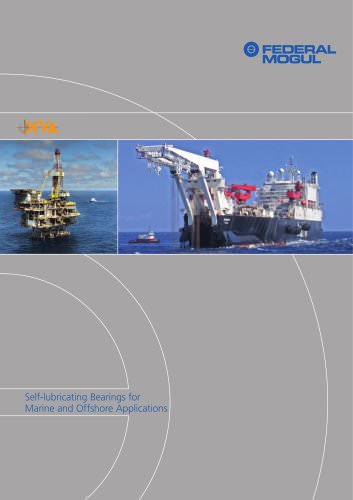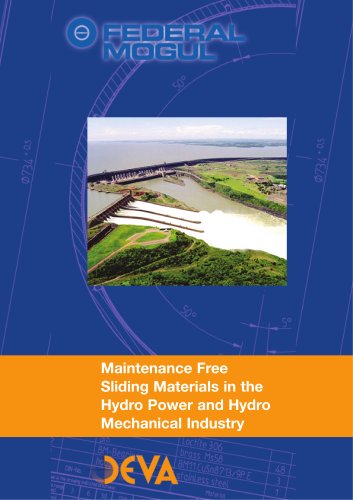 Website:
Federal-Mogul Deva GmbH
Website:
Federal-Mogul Deva GmbH
Group: Tenneco Group
Catalog excerpts

Technical manual deva.de | Maintenance-free, self-lubricating sliding bear
Open the catalog to page 1
Your challenges are our fascination. Self-lubricating fiber composite sliding bearings Contemporary designs pose major challenges for modern sliding materials. Maintenance-free operation is often expected even under difficult operating conditions with extremely high loads. Constant cost pressure forces increasing availability of machines and systems, even though no restrictions can be accepted with regard to their reliability. With maintenance-free, self-lubricating high-performance sliding materials from the DEVA® product range, it is now possible to implement sliding bearing concepts that...
Open the catalog to page 2
Maintenance-free, self-lubricating sliding bearings
Open the catalog to page 3
A long service life is our standard for your application. deva.tex® materials are suitable for applications with high, long-lasting static and dynamic loads, at relatively low sliding speeds in any direction of movement. They are also suitable for use where conventional lubrication is not possible or where other resistance requirements exist, e.g., wear, specific operating and environmental influences, impact stress, edge pressure, vibrations, etc.. Typical applications for deva.tex® fiber composite sliding bearings can be found in these industries: Hydro-Civil engineering Bridges and steel...
Open the catalog to page 4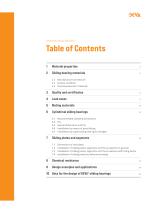
Technical manual deva.tex® Material properties 2 Sliding bearing materials 2.1 Microstructure and texture 2.2 Surface condition 2.3 Overview deva.tex® materials Load cases Mating materials Cylindrical sliding bearings 6.1 Recommended standard dimensions 6.2 its F 6.3 Special dimensions and fits 6.4 nstallation by means of press-fitting I 6.5 nstallation by supercooling with liquid nitrogen I Sliding plates and segments 7.1 Dimensions of raw plates 7.2 Installation of sliding plates, segments and thrust washers in general 7.3 Installation of sliding plates, segments and thrust washers with...
Open the catalog to page 5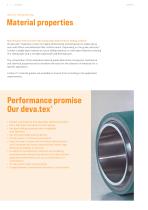
deva.tex® sliding bearings Material properties Maintenance-free and self-lubricating high-performance sliding material All deva.tex® materials consist of a highly dimensional and temperature stable epoxy resin with fillers and additional fiber reinforcement. Depending on the grade, deva.tex® is either a single-layer material as a pure sliding material or a two-layer material consisting of a sliding layer and a strength-optimized load-bearing layer. The composition of the individual material grade determines its physical, mechanical and chemical properties and is therefore the basis for the...
Open the catalog to page 6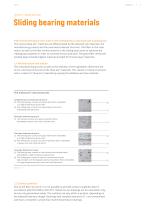
deva.tex® sliding bearings Sliding bearing materials Fiber-reinforced epoxy resin matrix with homogeneous solid lubricant incorporation The various deva.tex® materials are differentiated by the selected raw materials, the manufacturing process and the associated material structure. The fillers in the resin matrix as well as the fiber reinforcements in the sliding layer serve to optimize the tribological properties in order to minimize friction and wear. The glass-fiber reinforced backing layer provides highest material strength for the two-layer materials. 2.1 Microstructure and texture...
Open the catalog to page 7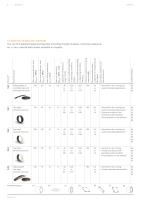
Friction coefficient depending on Operating conditions (dry) µ Friction coefficient depending on Operating conditions (water) µ Minimum hardness of mating material [HB] Recommended surface roughness of mating material Ra | [µm] • eneral for dry running and G water lubricated applications One-layer laminate structure • eneral for dry running and G water lubricated applications • ested according to DIN T EN 45545-2:2016-02 (R23) (fire protection in rail vehicles) Two-layer laminate structure • eneral for dry running and G water lubricated applications Two-layer laminate structure • eneral for...
Open the catalog to page 8
Max. permissible dyn. load p stat/max | [MPa] Application temperature range T | [°C] Friction coefficient depending on Operating conditions (dry) µ Friction coefficient depending on Operating conditions (water) µ Minimum hardness of mating material [HB] Recommended surface roughness of mating material Ra | [µm] • eneral for dry running and G water lubricated applications • NV approved for offshore D applications Two-layer filament structure • eneral for dry running and G water lubricated applications • specially for higher quantities E • nly available in standard O tolerance D11 according...
Open the catalog to page 9
deva.tex® sliding bearings Quality and certificates Environmental protection and production safety We attach great importance to a qualitative, environmentally conscious and safe production. We are committed to this through the application of a variety of internationally recognized standards for quality assurance, emission control and workplace safety. • RoHS und REACH compliant • Certificate of origin • Acceptance test certificates DIN EN 10204 – 2.1; 2.2; 3.1 and 3.2 • Certified according to ISO 9001; ISO 14001 an
Open the catalog to page 10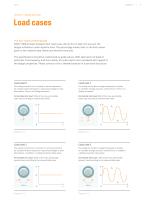
deva.tex® sliding bearings Load cases The four cases of bearing load DEVA® differentiates between four load cases. We do this to take into account the fatigue influences under dynamic load. The percentage values refer to the limit values given in the material data sheets and technical manuals. The specifications should be understood as guide values. With alternation of loads in particular, the frequency and the number of cycles need to be considered with regard to the fatigue properties. Please contact us for a detailed analysis in a personal discussion. The acting normal force is constant...
Open the catalog to page 11
deva.tex® sliding bearings Mating materials Roughness and surface finish The deva.tex® sliding materials require the use of a mating material with a hardness of at least 180 HB. A hardened surface should be used in the event of abrasive particles from the environment. When using deva.tex®, the surface roughness is ideally Ra = 0.4 to 1.0 μm, produced by grinding. Depending on the operating conditions, greater surface roughness can also be accepted. With regard to the surface finish, it is also possible to use protective sleeves with corresponding hardness. Overlay welding or other...
Open the catalog to page 12All Federal-Mogul Deva GmbH catalogs and technical brochures
-
deva_metal_EN
21 Pages
-
deva_glide_EN
17 Pages
-
deva_bm_EN
32 Pages
Archived catalogs
-
DEVA Spherical Bearings
32 Pages
-
deva.metal technical handbook
24 Pages
-
deva.bm technical handbook
24 Pages
-
deva.glide technical handbook
20 Pages
-
deva.tex technical Handbbok
20 Pages
-
Product Range
12 Pages









